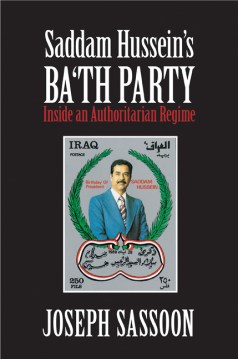Baghdad-born Joseph Sassoon has peeked into the heart and soul of the late Saddam Hussein and his Ba’th party, thanks to the millions of documents, audiotapes and other regime remnants the U.S. military collected inside their homeland following the 2003 U.S. invasion.
In Saddam Hussein’s Ba’th Party: Inside an Authoritarian Regime, Sassoon details how Saddam operated, kept his small circle of confidants content, and maintained his grip on power for more than 30 years. His bottom line on the invasion: “The toppling of Saddam Hussein was a good thing for the Iraqis, but unfortunately the result was worse.” Battleland conducted this email exchange with Sassoon, an adjunct professor of Arabic studies at Georgetown University, earlier this week:
What is the most important thing you learned in researching and writing Saddam Hussein’s Ba’th Party: Inside an Authoritarian Regime?
There are many interesting aspects that the documents of the Ba‘th Regional Command and the audiotapes of the Revolutionary Command Council show us:
The regime was not based on fear only; an extensive system of rewards for affiliates and supporters of the Party created a parallel to punishments and violence that the regime used against its opponents.
The party and the regime were well-organized and dealt with crisis after crisis without any internal force being able to shake its foundation.
The information collected about Iraqi citizens was formidable and can easily be compared to the Stasi or the KGB during Stalin.
While the regime pretended from the late 1980s till its collapse that it has become more religious, the reality was that Saddam Hussein continued to be very secular and repression of any religious group continued unabated.
— What would surprise readers of the book the most?
Saddam Hussein was actually the most natural ally of the U.S. and the West: he fought Islamic fundamentalism long before 9/11; Wahhabism was banned from the mid-1990s and the death penalty imposed on any follower of that sect. Furthermore, he continued to see Iran as the main enemy of Iraq to his last moment. Thus the two enemies that the West is fighting today were the enemies of Saddam Hussein and he was determined to weaken both.
— Just how bad was Saddam Hussein? Was he truly evil?
The image of Saddam Hussein we had was somewhat incorrect. His personality was very complex and any attempt to generalize about it in one sentence is bound to fail. While he was ruthless and determined to uproot any opposition, many of those who worked with him said he was also caring and attentive. All cabinet meetings of what was called the Revolutionary Council were taped; there are about 1,200 hours of those recordings at the National Defense University in Washington DC.
When you listen to the audiotapes, he does not come across as the typical tyrant. Although he was in complete control of all meetings he was polite, rarely interrupted anyone, and if he did, would immediately apologize. At the beginning of each meeting one could immediately sense his mood, and no one dared to contradict him or to say anything that might infuriate him if he were in a gloomy mood. On the other hand, he often sounded jovial and loved to tell stories and anecdotes, prompting other attendees to join in and joke or tell stories. He was very good at manipulating his colleagues and absolutely ruthless if he sensed any form of disloyalty.
— What did Saddam Hussein do right?
He created stability for the country and economic boom in the 1970s, but even then repression of any opponent was paramount. During the 1970s and most of the 1980s, women in Iraq achieved high standards in education and in jobs, as Saddam Hussein was very much in favor of modernizing the country and rightly believed that the country cannot make serious leaps without improving the conditions of women. Unfortunately all this changed in the late 1980s as he launched the faith campaign and with it he took a very traditional attitude towards women. The country survived the severe sanctions of the 1990s and by 2001 recovered most of the damage inflicted on it during the First Gulf War of 1991.
— Did Saddam Hussein have a nice side? If so, please elaborate.
He was definitely a very charismatic person and could be kind and attentive to his fellows. He also enjoyed an incredible photographic memory that enabled him to remember who was with him and who was against him literally from his childhood. He worked extremely hard, and he expected everyone around him to do so. He read a lot and suggested to his generals to read a book every month as he believed that it would improve their fighting capabilities.
— Was he militarily incompetent, or did he just seem to be?
This was a major problem: He was not accepted to the military college when he applied after finishing his high school. This made him bitter against the military and believed to the end that he was an incredibly talented military strategist. In interviews that I conducted with a couple of Iraqi generals, it becomes obvious that he lacked basic understanding of military affairs but sometimes he compensated for it by being daring and innovative.
— Was the U.S. and its allies right to invade Iraq in 2003 to oust him?
The toppling of Saddam Hussein was a good thing for the Iraqis, but unfortunately the result was worse: Iraq might have some democracy today but it paid a heavy price and continues to pay that: hundreds of thousands of Iraqis were killed and maimed, almost two million citizens became refugees in neighboring countries, and today corruption, sectarianism, and lack of security dominate the country in spite of its vast wealth.



